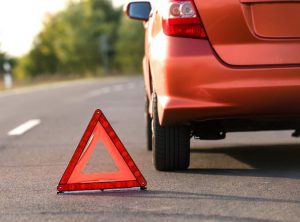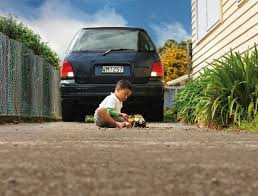Your Foolproof Formula for the Perfect Roadside Emergency Kit
 Jenny breathed deeply. She looked up at the clock. Five minutes left. Her last class before spring break was droning on and on! She felt as if she had been sitting there for hours. In only a few moments, she would be rushing back to her apartment, grabbing her stuff, and on her way home to her family. Half-way done with her second semester of college, Jenny hadn’t seen her parents since Christmas. Initially, her friends had wanted her to road trip to Los Angeles with them for Spring Break, but that sounded expensive. She opted instead to spend some time back home. Her mom had promised they would make it worth it for her. Also, it would be good to see her little sister. As the bell echoed faintly in the hallway, Jenny scrambled out of the door, almost forgetting her backpack.
Jenny breathed deeply. She looked up at the clock. Five minutes left. Her last class before spring break was droning on and on! She felt as if she had been sitting there for hours. In only a few moments, she would be rushing back to her apartment, grabbing her stuff, and on her way home to her family. Half-way done with her second semester of college, Jenny hadn’t seen her parents since Christmas. Initially, her friends had wanted her to road trip to Los Angeles with them for Spring Break, but that sounded expensive. She opted instead to spend some time back home. Her mom had promised they would make it worth it for her. Also, it would be good to see her little sister. As the bell echoed faintly in the hallway, Jenny scrambled out of the door, almost forgetting her backpack.
In her apartment, she quickly threw the remaining objects she hadn’t packed the night before into a tote. She was anxious to get on the road. If she left now, she would be pulling into her parent’s driveway by eight o’clock tonight. She shouted a hurried goodbye to her roommates and hurried out to the parking garage.
Fortunately, the roads weren’t as crowded as she had expected. Jenny weaved in and out of traffic for a few hours until she reached what was, in her head, the midpoint of the journey. She stopped for some gas, called and told her mom she was on her way and continued busily on her trek.
Jenny could barely hear the sputtering of her engine over her loud music. As it continued to grow louder, she lowered the volume. Something wasn’t right. She slowed down a little but continued to listen intently for that distant grunting coming from the engine. Suddenly, smoke started issuing from under the hood. Instinctively, Jenny pulled to the side of the road. She felt a twinge of panic. What should she do? She didn’t know anything about cars! She turned on her emergency lights and called her mom.
Jenny’s experience might sound familiar to you. Thousands of people are stopped on roads and highways every year due to unforeseen car troubles. These troubles may range from a flat tire to a damaged alternator. They usually happen when you least expect them. While you cannot control the functionality of your vehicle, you can control your preparedness for such situations. Especially when taking a longer road trip. For example, a roadside emergency kit is a good resource to have at your disposal. It can help ensure your safety and, in worst case scenarios, perhaps preserve your life.
Various companies offer pre-made roadside emergency kits. These kits are good options to keep in your trunk or another area of your car. These kits are pretty good because they cover all of your bases. When you purchase one of these pre-assembled kits, they will often have handy items that you might not have considered to be of use, unless in an emergency situation. These pre-made kits are available for purchase at various locations. For instance, AAA sells a kit on Amazon.com and Walmart that is pretty good. Similarly, other companies like Justin Case are good options.
Some people prefer to create their own, personalized kit. This option can be good for many people because it allows them to customize their kit and become very familiar with what items are inside. Whether you decide to purchase a kit or make your own, there are some matters you’ll want to consider:
- First Aid Kit. One of the most important items you can pack is a first aid kit. The first aid kit will include things like bandages, medicine, gauze pads, antiseptic, hand sanitizer, etc. This first aid kit should include things that you think you could use in any situation involving your health and the health of your passengers. Again, this could be something purchased or something assembled at home. If purchased, companies sell car-specific first aid kits.
- Prepare for Any Season. You want to be sure that you prepare for the worst of any season. For example, if you live in an area where the winters are particularly treacherous, you’ll want to pack items in your kit that are ready for that. For example, an ice scraper, a blanket, rain jacket, cat litter (for snowy roads), etc.
- Typical Car Items. You’ll want to include items that you would typically want in a car emergency. For example, a small fire extinguisher, jumper cables, a flashlight, flares or cones, etc. Other items might include things like checking beforehand that you have all of the necessary tools to change your tire. For example, a multi-purpose tool to remove the bolts from the tire.
- Odds and Ends. There are other items that you may like to include that largely based on personal preferences. For example, some non-perishable snacks like granola bars and drinks like bottled water might be good options in case you have to wait for a long period if they have to tow your car.
The list provided is not meant to be exhaustive. Other lists found around the web will provide you with more things than you could ever dream of having in your trunk. Rather, this list is meant to get you thinking about what items will meet your needs and be beneficial to you. As mentioned, while you cannot completely prevent an emergency, you can do your best to protect yourself when emergencies happen.
Jennifer waited patiently for the tow truck to arrive. Her mom was on her way to pick her up, and they would figure out what was wrong with the car the next day. Fortunately, she had a blanket in her trunk. As night began to fall, the temperature began to drop. Car troubles were not a good start to her spring break! But, Jennifer was glad she had the emergency kit in her trunk.
Written by The Advocates Personal Injury Lawyers serving Utah, Montana, and Washington with the mission of protecting individual rights for people who have been injured or involved in an accident.
Tag:driver's education, drivers ed, Montana lawyers, Pittsburgh Defensive Driving, Pittsburgh Drivers Ed, Pittsburgh Drivers Education, Pittsburgh Driving School, Pittsburgh Roadside Emergency, Pittsburgh Roadside Emergency Kit, Roadside Emergency, Roadside Emergency Kit, The Advocates Personal Injury Lawyers, Utah lawyers, Washington lawyers




